Fighting for a malaria-free world
Commitment to new innovation in vector control means peace of mind for African communities

Imagine a world where no parent loses a child to a mosquito bite. Where economies thrive, unburdened by a preventable and treatable disease. Imagine a world where children grow up healthy, their potential fulfilled.
“The human impact of malaria in sub-Saharan Africa remains huge, one child will die every minute and 30 seconds from malaria,” says Syngenta’s Dr Rose Peter, an expert in vector control with more than two decades of experience supporting African communities in their fight against malaria.
Despite significant progress over the past 20 years in vital intervention techniques such as bed nets, indoor residual spraying (IRS), effective treatments and the recent introduction of vaccination programmes - which have all contributed to a reduction in malaria deaths by up to 50 percent in the period 2003-2023 - the mosquitoes are still winning. The 2024 World Health Organisation’s (WHO) Global Malaria Report paints a concerning picture, revealing a rise in global malaria cases in 2023 to 263 million, an increase of 11 million from the previous year.
Close up of mosquito Anopheles stephensi. Photo credit: Syngenta R&D center, Christian Spycher.
Close up of mosquito Anopheles stephensi. Photo credit: Syngenta R&D center, Christian Spycher.
When malaria strikes, its devastating impact is felt across families and communities, affecting every aspect of life. If a farmer falls ill from the disease during harvest time, crops yields can plummet, resulting in a drop in family incomes by up to 50 percent.
“You can imagine, not only are there deaths, but the people who get sick, they cannot work, they cannot go to school, they cannot cultivate their fields, and this all has a huge cost and impact on their lives and livelihoods,” Peter says.
Today, malaria is still ranked as one of the top causes of death in low and middle-income countries, and figures show that children under the age of five are the most vulnerable.
The sobering statistics highlight the continued need for support in vector control. There are around 600,000 fatalities from malaria every year – 76 percent of these are children. That’s more than 1,000 children dying of malaria every day, mostly in Africa.
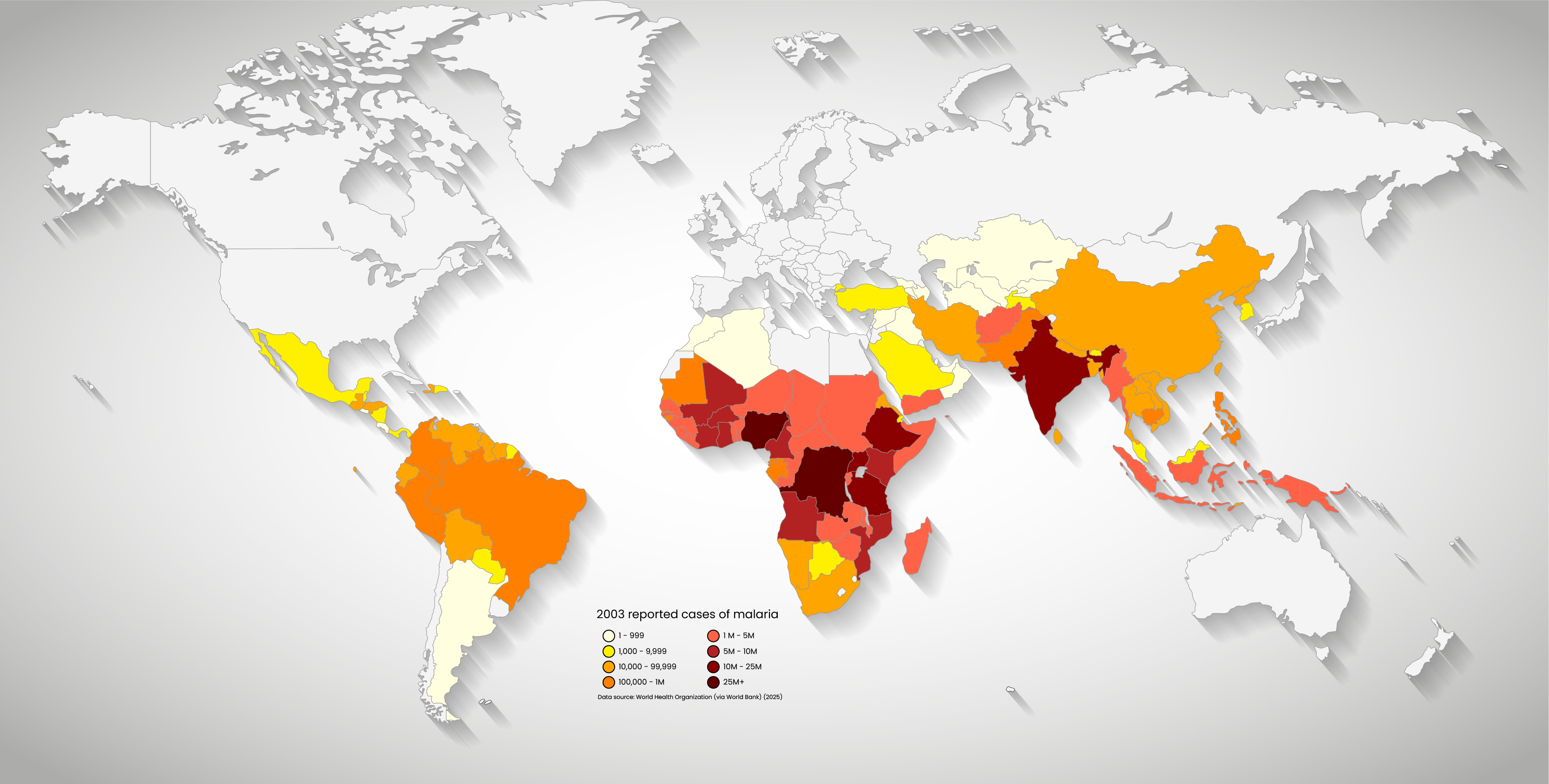

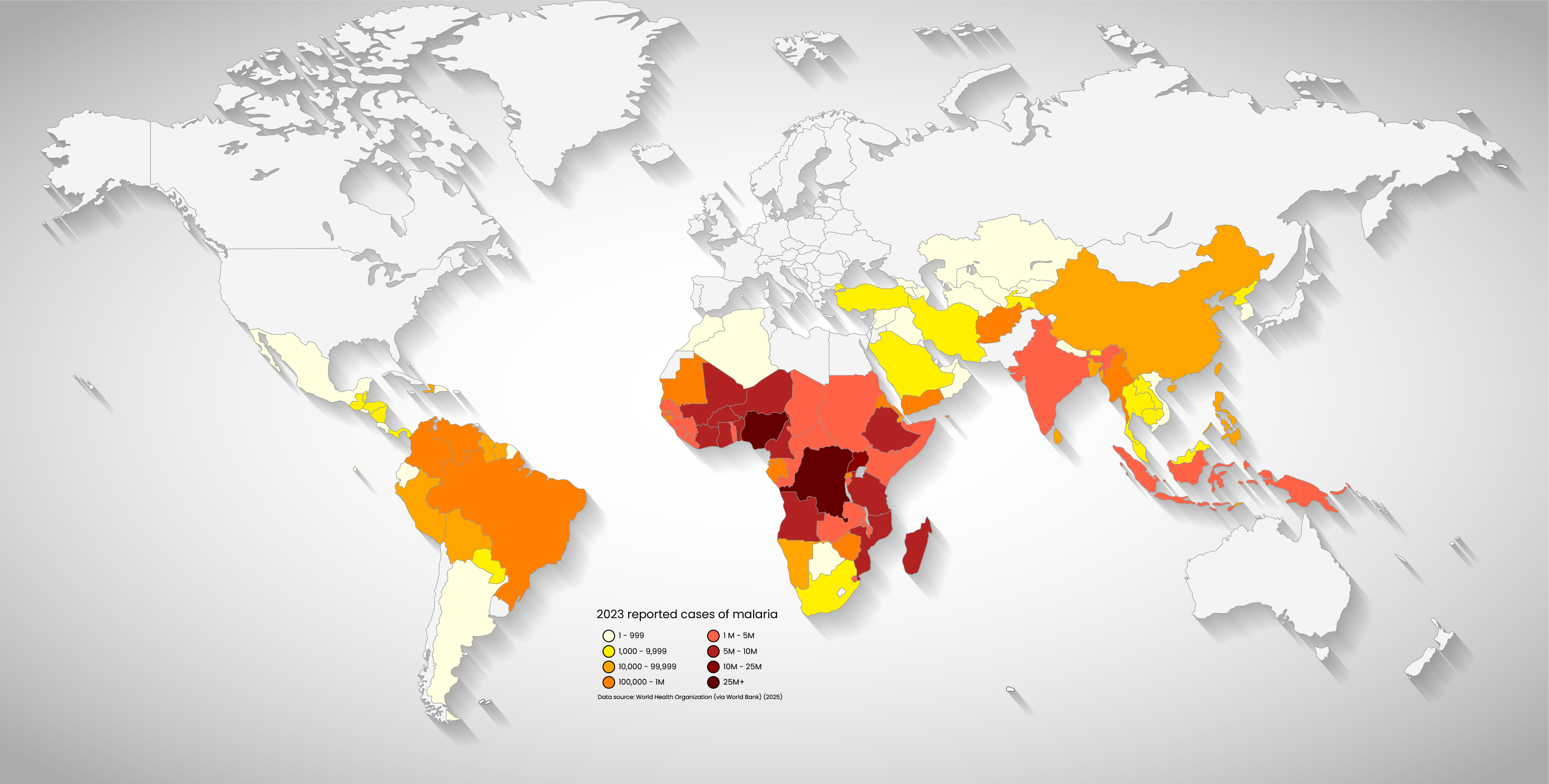

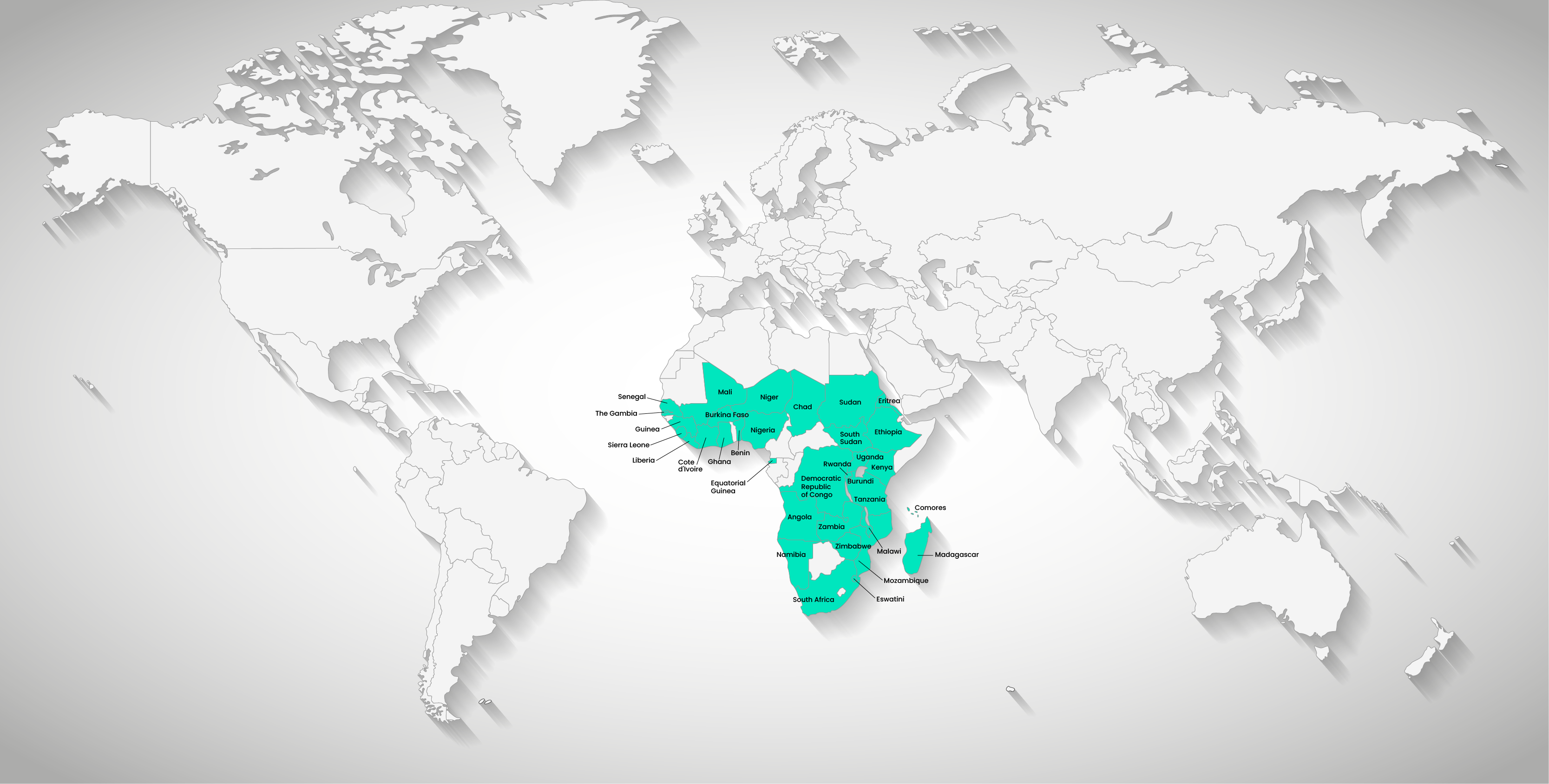

Reported cases of malaria in 2003.
Reported cases of malaria in 2023.
Syngenta is active in more than 30 countries, providing vector control programs to affected communities.
The perfect storm
Malaria thrives in chaos, flourishing in environments marked by instability and vulnerability. Whether it’s the unpredictable patterns of climate change, social disorder in communities, weakened government systems, or the grip of poverty, combating malaria requires a steadfast and well-resourced approach.
Many communities still lack access to quality prevention and treatment measures, while humanitarian crises and escalating impacts of climate change disrupt existing prevention strategies and amplify the risks for already vulnerable populations.
“Climate change is the perfect storm,” explains Peter. “We see increased rain and increased malaria. In many cases, we're seeing an increase in severe and adverse weather events such as cyclones. Mozambique has been hit particularly hard in the recent past and Malaria thrives in these conditions,” she adds.
“Malaria and poverty go together, and one of the best ways to help is by alleviating the effects of malaria by preventing it.”
Eliminating malaria depends on a combination of factors and varies from country to country, says Peter.
“For example, Rwanda has been very successful because they've relied very heavily on IRS and nets in combination and separately, and they are now branching out to look at larvicides [products targeting pests in the young larvae stage] as well. There are other countries, however, where they can't even get the programs off the ground every year due to weaker systems.”
Many communities still lack access to quality prevention and treatment measures.
Many communities still lack access to quality prevention and treatment measures.
Humanitarian crises and escalating impacts of climate change disrupt existing prevention strategies.
Humanitarian crises and escalating impacts of climate change disrupt existing prevention strategies.
Funding challenges
Malaria prevention programmes throughout sub-Saharan Africa rely heavily on international funding. Recent reductions in aid by key donor countries, such as the US and the UK, are an example of a new challenge in the fight against malaria.
Nevertheless, some countries are already exploring alternative new funding models to sustain their vital programs, despite the funding gaps.
Mehdi Ibenbrahim, Syngenta Professional Solutions (SPS) Commercial Head Vector Control, North, West and South Europe, who has first-hand experience in numerous malaria-affected countries, says: “The funding restrictions are something rather new, but our mission remains to support the African countries and the communities to combat malaria.
“We are confident that one way or another the fundings will be addressed. It will reorganise itself naturally. Our commitment is to the African communities.”
Syngenta was one of the first companies to bring products for long-lasting IRS to market and has continued to invest in cutting-edge research and innovation.
Syngenta was one of the first companies to bring products for long-lasting IRS to market and has continued to invest in cutting-edge research and innovation.
Noting a positive trend where countries are increasing domestic funding for malaria programs, Simon Elsworth, Head of Professional Solutions Europe at Syngenta, says: “Governments are now stepping up and looking at ways to fund themselves. The funding models might change, but the need is still there.
“Our job is to stay close to those countries and to those markets and to be able to work with them in a collaborative way to enable the products still to be used and to deliver those benefits to communities.”
The immediate impact of the aid cuts is already being felt on the ground, with countries unable to distribute nets this year for example because of the lack of funding, says Peter.
She emphasizes the growing importance of collaborative approaches going forward. “The future of malaria control is going to be based on a lot of private, public partnerships.
Photo credit: Goodbye Malaria
Photo credit: Goodbye Malaria
“Have you have ever eaten in a Nando’s?” Peter asks. “The Goodbye Malaria project in Mozambique is a lovely story. In Nando's, much of the PERi-PERi chili comes from Southern Africa and is a critical ingredient of the Afro-Portuguese cuisine. To ensure the farmers who grow their chilies are protected, Nando’s has been supporting IRS programs particularly in Mozambique. This program has been extremely successful with a major reduction in malaria cases.”
The partnership with Nando’s is a powerful example of how the private sector can drive real, measurable impact in public health, says Sherwin Charles, co-founder and chief executive of Goodbye Malaria.
“Together, we’ve built a high performing IRS program that’s transforming Mozambique, not just by reducing malaria by over 75 percent in the areas in which we operate, but by unlocking economic opportunity and resilience at community level.
“We’re not just fighting malaria; we’re building capacity, creating jobs, increasing access to quality interventions and enabling communities to take ownership of their health outcomes.”
While the malaria control toolbox has expanded, each solution faces its own set of challenges. Insecticide resistance threatens the effectiveness of IRS, ensuring consistent and correct use of bed nets can be difficult, and while vaccines offer promise, their efficacy is limited (40-60 percent) and they can be costly. It's evident that no single approach can eradicate malaria. Progress demands sustained efforts, increased resources, and continued innovation to overcome these obstacles.
Success Story:
Pilgrim Africa
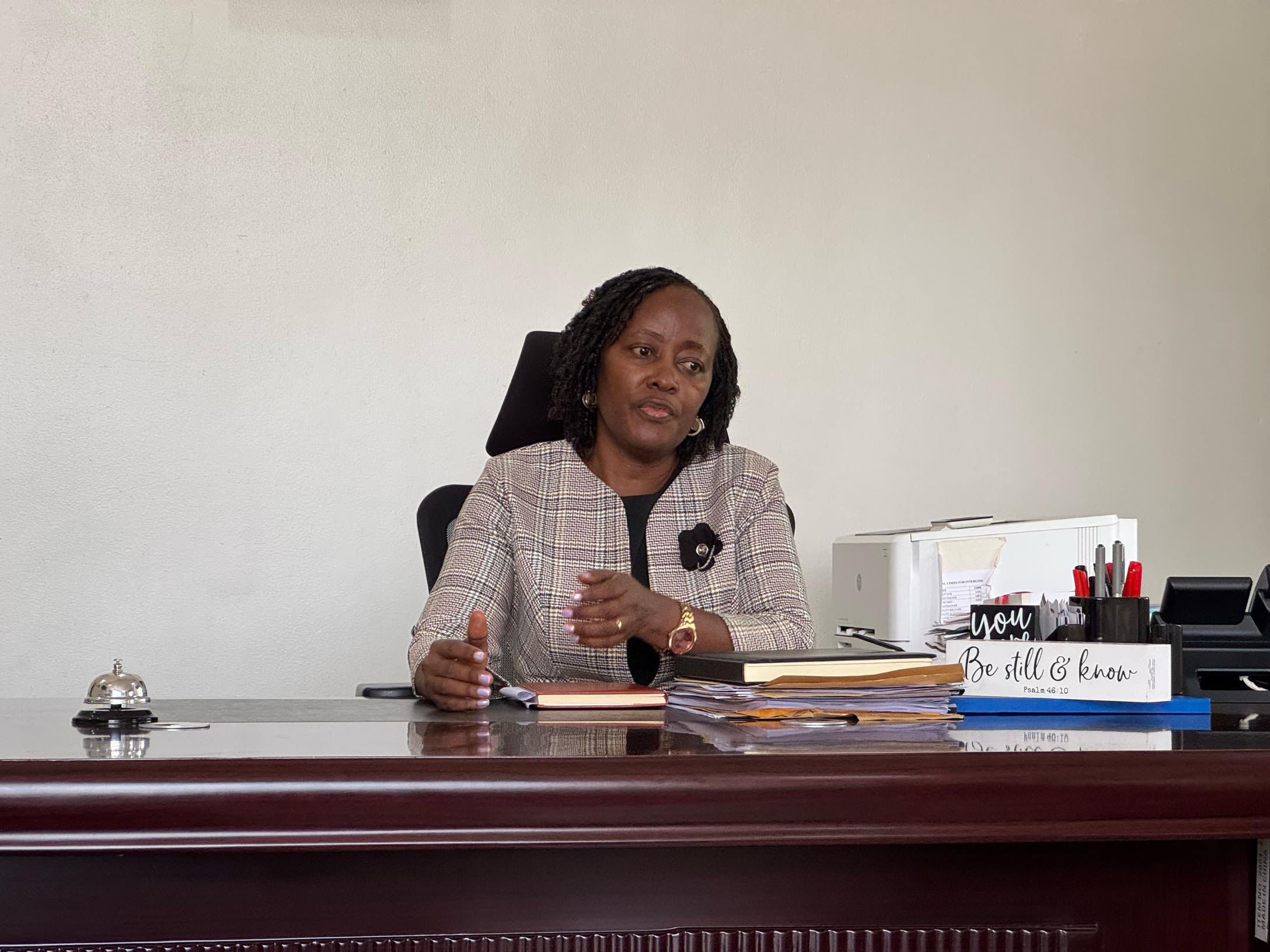
Kizito Robinah Katongole, Head Teacher, Gayaza High School.
Kizito Robinah Katongole, Head Teacher, Gayaza High School.
How IRS plays a key role in ensuring students reach their potential.
A robust commitment to IRS is improving the lives and educational opportunities of Ugandan students, a population highly vulnerable to malaria.
Figures from Pilgrim Africa show that ‘a school in a high transmission area with 1,000 students can easily record 1,200 or more cases of malaria in a year’.
The Pilgrim Africa initiative works with boarding schools in Uganda to address this critical issue. “It’s a lovely story in Uganda at the moment,” Rose Peter says. “It has just been made law that you may not run a boarding school unless you have a proper malaria control program in place.
“Pilgrim raises funds and they spray all the schools with IRS, and that's fantastic, because the children don't miss school because of malaria,” she adds.
Proactive steps
In partnership with the Ministry of Health - Uganda and Pilgrim Africa, the Gayaza High School is taking proactive steps against malaria and has implemented IRS in its new Warren Dormitory.
Head Teacher Kizito Robinah Katongole emphasizes the initiative's importance: "Malaria is a serious threat in boarding schools. This reassures us that our students will be safer, healthier, and better able to focus on their education."
Gayaza High School joins
a growing network of schools committed to student health in the Teso sub-region and Syngenta's Actellic® plays a key role in the program's success, providing long-lasting protection against malaria transmission.
A dedicated partner
Syngenta is proud to be a committed partner in the fight against malaria. The organisation operates in more than 30 countries, providing IRS solutions which also include on-the-ground support and training programs designed to maximize effectiveness and engagement within communities.
“The vector control toolbox undoubtedly over the years has widened,” says Ibenbrahim. “There are nets, IRS, larvicides and spatial repellents.
“One of the most effective measures to combat malaria is IRS and we believe it will remain a key intervention in malaria control. For sustainable vector control and to help deliver the goals of malaria eradication, it’s vital that funding is available for IRS,” he adds.
However, Andy Bywater, Global Head Marketing Professional Pest Management at Syngenta, cautions against the trend of shifting funds away from IRS towards a sole reliance on nets.
“Both interventions have great impact on reducing malaria, but we need multiple tools to manage the resistance and therefore IRS still remains a core component of many malaria control programs, so diverting funding away from that is very risky business when you’re trying to maintain malaria control.”
Compliance issues are one of the biggest problems with using nets alone as a solution, explains Peter. “You often go into houses and you'll see the nets unopened on shelves. They're used for other things, from anything from bridal veils to fishing nets, to putting over the vegetables they are growing at night to prevent them from being attacked by insects.”
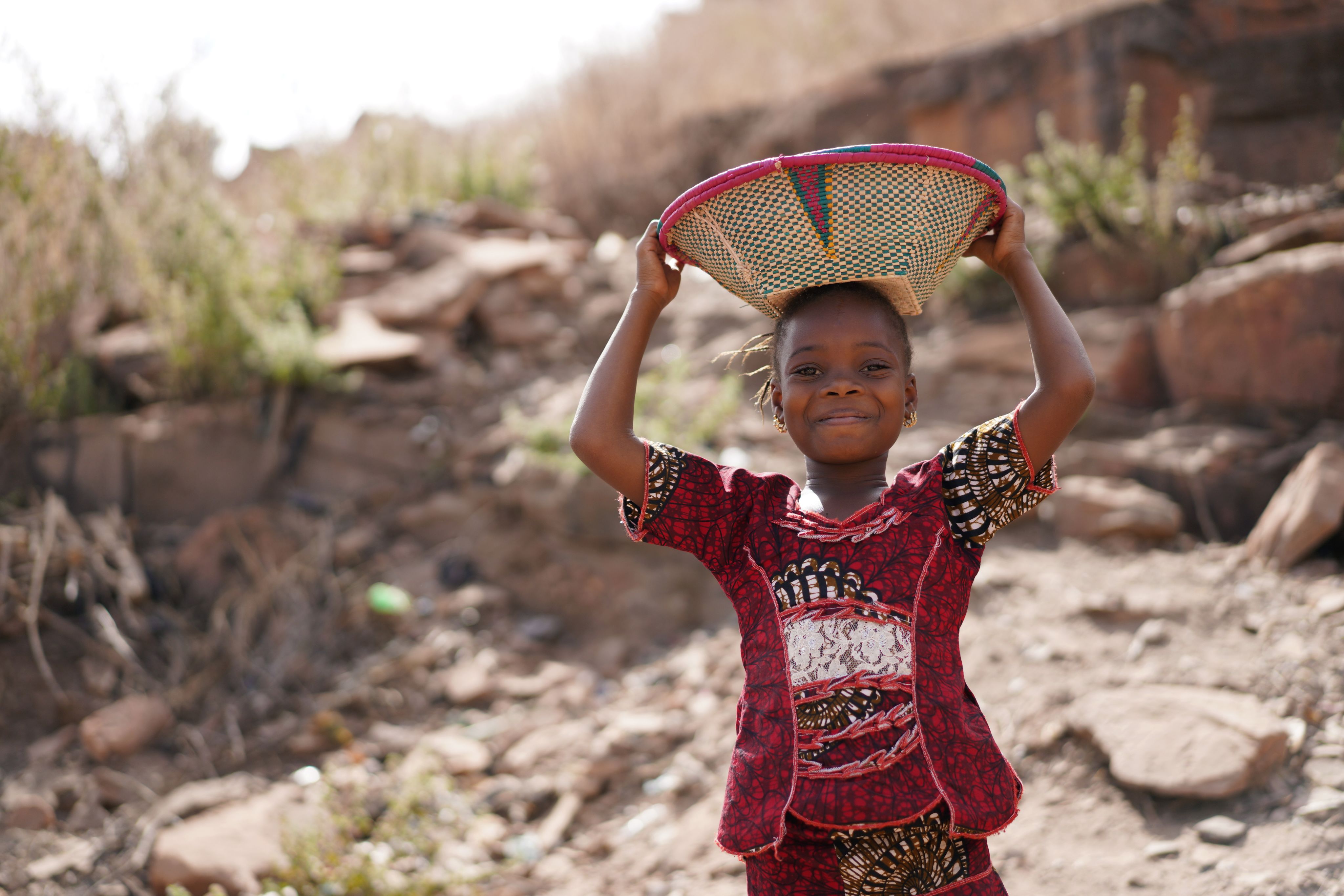
Innovative solutions
Despite concerted efforts, no country has ever controlled or eradicated malaria without IRS. As World Malaria Day approaches, with the WHO urging a renewed commitment to ending malaria, Syngenta stands at the forefront of innovation in IRS, poised to introduce a new product called Sovrenta®, which has been pre-qualified by the WHO.
Sovrenta® harnesses the power of cutting-edge PLINAZOLIN® technology and represents the latest advancement in insecticide innovation, offering a new generation of solutions to combat mosquito-borne diseases.
The insecticide is applied to the walls of people’s homes and transfers to the mosquito when it lands.
The insecticide is applied to the walls of people’s homes and transfers to the mosquito when it lands.
Designed for indoor use, it is applied to the walls of people’s homes and transfers to the mosquito when it lands. It works by targeting a mosquito’s nervous system and is highly effective, even where mosquito populations have evolved to be resistant to older insecticides.
Syngenta was one of the first companies to bring products for long-lasting IRS to market and has continued to invest in cutting-edge research and innovation, as Elsworth explains.
“With our current product Actellic®, we’ve impacted the lives positively of over 100 million people across sub-Saharan Africa and that’s a huge contribution to make and something we’re really, really proud of.
“The launch of Sovrenta® enables us to offer two top performing solutions which can be rotated to reduce the risk of resistance development.”
Since its introduction in 2013, Syngenta’s Actellic® 300CS has been instrumental in reducing malaria cases by up to 64 percent in areas where IRS has been implemented.
Communities employing effective IRS interventions have significantly reduced cases of malaria.
Communities employing effective IRS interventions have significantly reduced cases of malaria.
Communities employing effective IRS interventions have significantly reduced cases of malaria. One example is the remarkable progress made in Rwanda, as Peter says.
“When they first started spraying in Rwanda, 54 percent of the population suffered at least one bout of malaria annually since the introduction of IRS. It's now down to 4 percent of the population who suffer one bout of malaria every year,” she says.
With Sovrenta®, only one application a year is necessary, reducing costs and limiting interruption to family daily life without compromising safety.
One step ahead of the mosquitos
Muthee explains the strategic importance of investing in a new product. “Actellic® has really delivered results. Sovrenta® is a rotation partner which you can use to alternate, because we don’t want to see resistance develop,” he says.
However, mosquitos are constantly evolving, meaning that their adaptability necessitates continuous innovation.
“Over time, both the mosquito and the parasite have become clever and developed resistance, both to the malaria treatments and to the insecticides that are used on the walls and nets,” says Peter.
“The behavior of the mosquitoes is also changing. What's happened is a lot of mosquitoes have learned its best not to go indoors anymore. They bite outdoors.
“The other thing that we tend to forget about is that there are other vector-borne diseases that are providing challenges, for example, dengue, and chikungunya virus, and we're seeing more and more outbreaks of those diseases, and we need something to control those mosquitos as well.”
Empowering communities
Success of any new product in this area relies on empowering communities through awareness campaigns and robust training.
Our relationships with these communities, teams, and key stakeholders are critical, says Peter.
“We provide a lot of background support in terms of training and support of programs and follow up, so we become friends, and we really are part of their team.”
As a trusted partner in affected communities, Syngenta’s commitment extends beyond simply providing products; ongoing support and collaboration are critical.
“One of our commitments to the National Malaria Control Programs (NMCP) that we work with is that our team on the ground contributes to what we call ‘train the trainer’ so we help the spray operators with our experience to ensure they apply the products accurately and diligently,” explains Ibenbrahim.
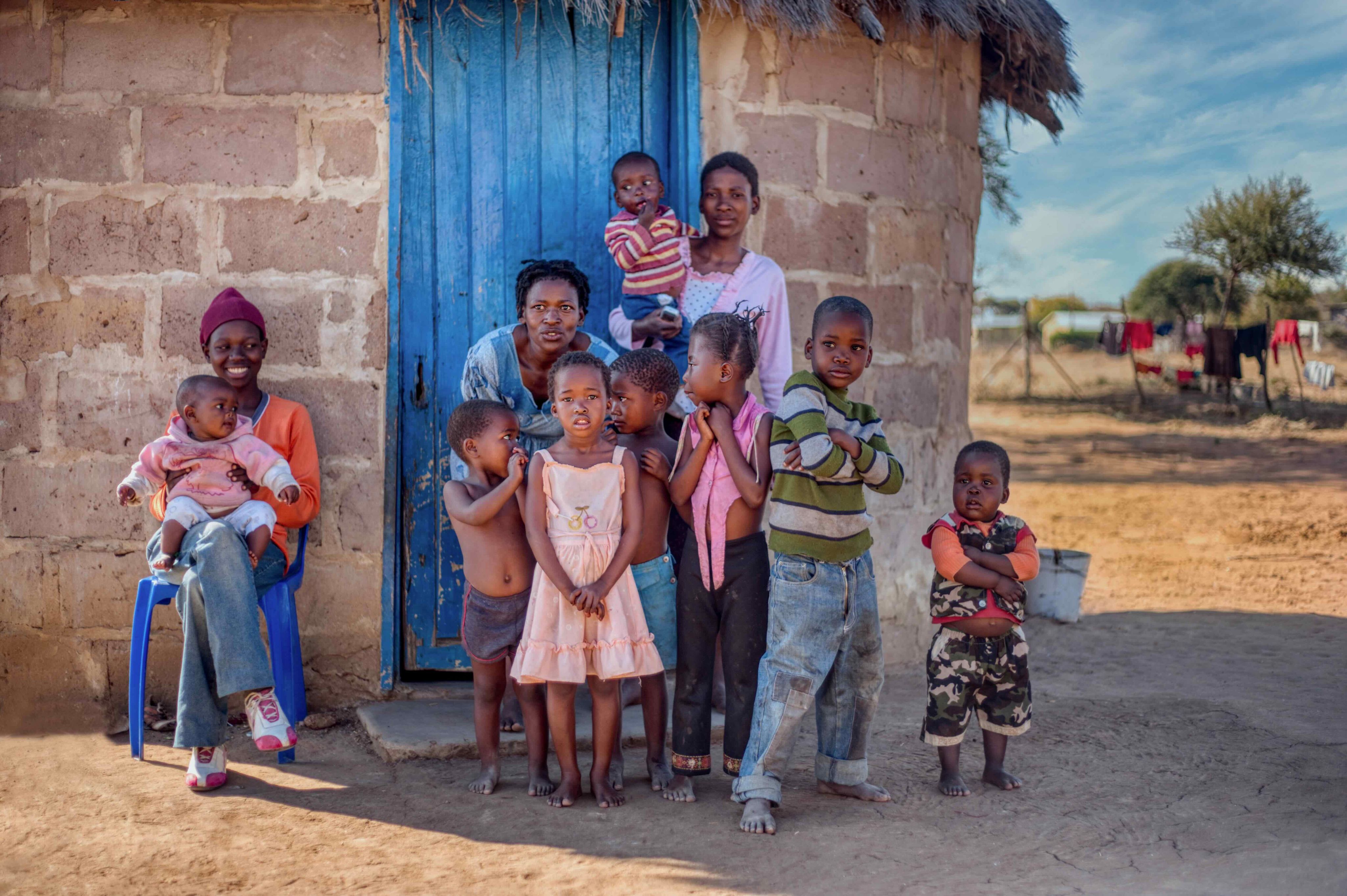
Dr Rose Peter, Commercial Head, Vector Control SSA, Syngenta.
Dr Rose Peter, Commercial Head, Vector Control SSA, Syngenta.
Hopes for the future
Despite ongoing challenges, the dedication of individuals working in malaria control remains unwavering.
“I believe we continue to make a difference,” says Peter, undaunted. “When we worked with the Mount Mulanje Mission Hospital in Malawi, for example, where, when they first started indoor residual spraying during the height of the malaria season, they would have at least 26 children in the intensive ward with acute malaria, and after they started spraying, they had maybe one child in the hospital with acute malaria. Our work makes a huge difference.”
As a trusted partner in affected communities, Syngenta’s commitment extends beyond simply providing products.
As a trusted partner in affected communities, Syngenta’s commitment extends beyond simply providing products.
Ibenbrahim continues: “When you listen to the stories, when you see really how very hard the local communities are trying to step up and deal with this challenge, it’s just a privilege to contribute a little, even very slightly, to saving someone’s life.”
“But I would like to see malaria reduced by at least half, if not eliminated,” says Peter. “And there are countries that will eliminate it. Recently Cape Verde eliminated it. Zanzibar has basically eliminated it. Egypt has eliminated it.”
The fight against malaria is far from over, but every step we take brings us closer to a malaria-free world. Syngenta shares the WHO’s goal of reducing malaria incidence and mortality by at least 90 percent by 2030.














